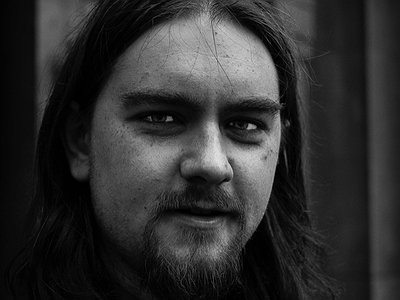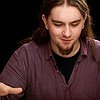Name: Matthew Whiteside
Nationality: Irish/British
Occupation: Composer and Artistic Director of 'The Night With...'
Current Release: Entangled on October 25th Pre-order now and save
Recommendation: Cixin Liu’s the Remembrance of Earth's Past Trilogy. It is an exquisite work of science fiction which is rooted broadly in current scientific thinking. The philosophy behind it, especially coming from a non-western standpoint, is really intriguing and when I finished the trilogy it felt like a monumental conclusion. I can’t recommend his work enough to anyone with even a faint interest in science or sci-fi.
Website/Contact: You can keep up with Matthew's releases and work at his website www.matthewwhiteside.co.uk
When did you start composing - and what or who were your early passions and influences?
I remember when I was about 15 being in music class at school and realising that composers weren’t just dead people in history books and that there were actually people writing classical music today. I found the contemporary classical music so much more engaging than the romantic music we were studying at the time. It was one class specifically I remember where my teacher started a listening session with Mozart and ended up finishing on Henry Cow and in between touching on Morton Feldman, Steve Reich, Thomas Ades and John Cage. There were a few more steps than that but those pointers opened my ears, especially Ades' Asyla.
Up until that point, my main listening had been whatever was on Classic FM along with metal and rock (such as Tool, Nine Inch Nails and Metallica). After that lesson, I put a lot more time into listening to contemporary classical music and also more and more time writing dots on a page rather than noodling about on the guitar.
For most artists, originality is first preceded by a phase of learning and, often, emulating others. What was this like for you? How would you describe your own development as an artist and the transition towards your own voice? What is the the relationship between copying, learning and your own creativity?
I feel like I’m always learning and developing though listening to and discovering new music, writing and working with new musicians and also just developing in confidence to do or try things I might not have done a few years ago. One of the most influential things during my development was reading "Morton Feldman Says”. There was a marked change in my music before and then after reading it. Before hand, I kept trying to do something new and different in every single piece, after I felt more like I could relax into my own voice. I am still working on that slowing down but it takes time and confidence to do not very much. The other influential things were discovering electroacoustic music and hearing Gerard Grisey’s Partials and Kaija Saariaho’s Près. These gave me a totally different outlook on what music can be and how classical instruments can work with electronics.
What were some of the most important creative challenges when starting out as a composer and how have they changed over time?
Almost every time I sit down to start a new piece there is a period of frustration where I think ‘how do you write music?!’ That seems to not have changed throughout all my years of composing. Pacing is probably the biggest thing that has shifted over time. When I was younger, and before reading Morton Feldman Says, I was impatient and got bored easily. Every few bars felt like they needed to be a new idea. Over time I’ve become a lot calmer and slower paced, dwell on ideas for a much longer period of time to let them breath.
Pacing combined with structure provides other challenges. Does the material you are using deserve this amount of time? If not do you change it or bring in something new? If you bring in something new will that make the piece longer than you want it to be? And then repeat those three questions throughout the composition process.
Tell us about your studio/work space, please. What were criteria when setting it up and how does this environment influence the creative process? How important, relatively speaking, are factors like mood, ergonomics, haptics and technology for you?
My living room is pretty much my studio at the moment. It has two large desks, keyboard, computer and lovely large bay windows. I start every piece by hand, using pen and paper, and the two desks are a kind of mental separation. On one desk I start writing then, once I know where the piece is going, I move to the other one. The second desk has the computer and technology around it to finish the piece, create the score and any electronic elements for the piece. At the moment, it is a bit of a compromise between a work space and a living room, hopefully that can change very soon.
Could you take us through a day in your life, from a possible morning routine through to your work? Do you have a fixed schedule? How do music and other aspects of your life feed back into each other - do you separate them or instead try to make them blend seamlessly?
My schedule seems to shift between composition and admin. When I’m composing I get up, have a quick breakfast and try and start to compose as quickly as possible until about lunch time. Between lunch and dinner, I spend a few hours doing admin, running errands or meeting a friend before doing a few more hours composition in the evening. When it is more admin-heavy, like when producing The Night With… concerts, then it’s closer to a more traditional 9-5 pattern because that’s when the people I need to talk to are at their desks. It’s more like 10-7 for me though, I’m not a morning person at all and prefer to work in the evenings when I can.
I generally try and only work on one piece at a time. I might park something for a week or two and move onto something else if I need time away from it but would never work on two different pieces on the same day.
I also try to go to as many concerts as I can and listen to new music every week for a few hours. It all feeds into the process.
There are many descriptions of the ideal state of mind for being creative. What is it like for you? What supports this ideal state of mind and what are distractions? Are there strategies to enter into this state more easily?
I’ve found starting to write before being fully awake helps get into and stay in that creative state of mind. That’s partially why I like to have two writing periods in the day. The first is a freer period of creation while the second is more about editing and thought-out development. Sometimes (often!) that can mean I write 20 bars in the morning and then delete 20 in the evening but that’s the way the process works.
Distractions are my phone and computer. When I’m composing I put my phone onto ‘do not disturb’ and the computer I use when composing doesn’t have email or Twitter setup on it. I don’t go as far as to turn off the router, because often I need to search for things, but I try and minimise outside distractions as much as possible while writing to keep the flow.
Could you take me through the process of composing on the basis of one of your pieces that's particularly dear to you, please? Where did the ideas come from, how were they transformed in your mind, what did you start with and how do you refine these beginnings into the finished work of art?
Quartet No. 4 (Entangled) is a good piece to use. It is a piece that combined many of my interests, both artistic and other, and was a really interesting commission from the Institute of Physics. They asked me to write a 15-minute piece inspired by the work of John Stewart Bell, a quantum physicist and my great uncle, to tie in with a lecture dedicated to him every year.
First of all, I went away and read about his work and tried to develop my understanding of quantum physics, not easy but it is a fascinating subject. Based on that, I decided each of the movements would be an exploration of a different concept and these concepts informed the musical character of the moments. Waves is a reference to the wave-particle duality and consists of a series of gestures which collapse in on themselves. Spooky Action references quantum entanglement described by Einstein as ’spooky action at a distance’. In this movement, I used delays to create an imagined ‘spooky’ quartet after the initial impulse of the real quartet. However, the delays only work 50% of the time, a reference to the predicted results for Bell's Theorem. Spinning is about the spin of a particle.
The general structure of the piece and of each of the movements was worked out beforehand as well mostly using Fibonacci. It is a simple technique but I find it really useful to work out the broad structure of a piece and how long sections might be before starting to write the dots. Once I have that I start a general sketch of the piece, then copy that sketch adding in musical material, copy that again adding in more detail. Sometimes a piece will go through 10 hand-written copies and refinement before I feel I know where it’s going or what it is actually about.



